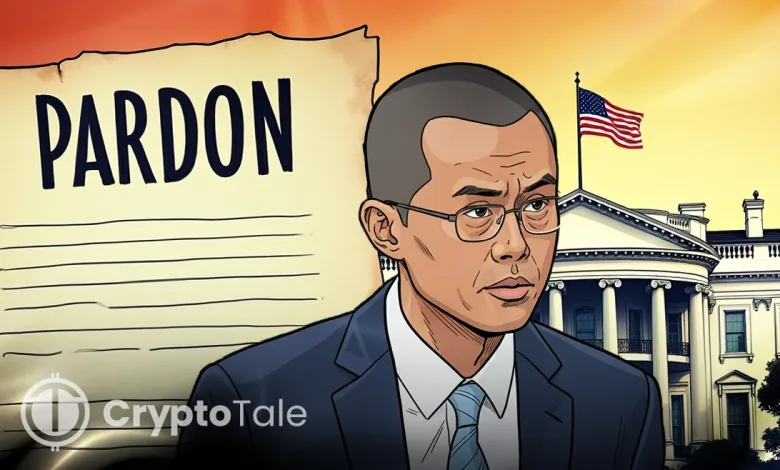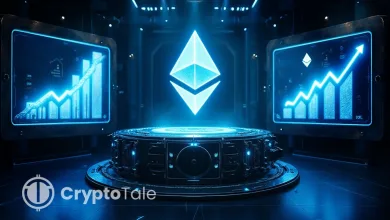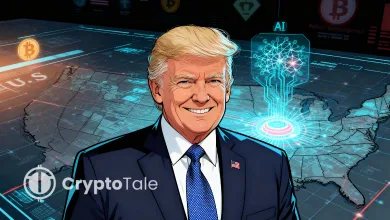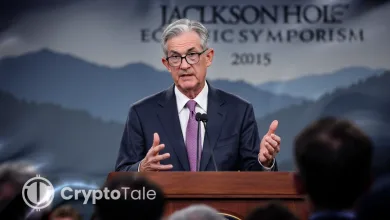Trump Weighs Pardon for Binance Founder Changpeng Zhao

- Trump advisers are split as talks reportedly advance on a possible pardon for CZ.
- A pardon could clear Changpeng’s felony record, but it cannot undo past regulatory limits.
- Kalshi data shows rising bets after reports from Charles Gasparino and other sources.
Rumors inside the White House have speculated over a possible pardon for Binance founder Changpeng Zhao. The discussions reportedly began gaining strength in recent weeks, according to accounts from individuals familiar with the matter. The talks concern a move that would erase Zhao’s federal conviction despite his sentence already being served.
Internal White House Divide
According to Fox Business Senior Correspondent Charles Gasparino, several advisers to President Donald Trump appear split over the idea. Some view the case against Zhao as excessive and influenced by the previous administration’s stance on crypto enforcement.
Others warn that clearing a high-profile conviction could attract backlash from lawmakers and regulators who treated the prosecution as a precedent for financial crime accountability. The reported deliberations come from Zhao’s 2023 plea deal with the U.S. Department of Justice.
At that time, prosecutors said Binance failed to establish a proper anti-money-laundering program and permitted transactions that bypassed sanctions and compliance controls. Zhao pleaded guilty to a Bank Secrecy Act violation, stepped down as CEO, paid a $50 million fine, and served four months in federal custody.
Binance also agreed to pay $4.3 billion, one of the largest corporate settlements on record. Notably, Gasparino stated that individuals close to Zhao believe the White House has recently intensified internal conversations about a pardon.
They claim some Trump insiders view the case as weak and undeserving of a felony conviction. However, aides reportedly remain cautious about public perception due to Trump’s growing connection to digital assets through associates and family projects.
What a Pardon Would Change for Zhao?
A presidential pardon would not remove the factual basis of his conviction. It would clear the felony from his record and lift the civil and legal restrictions still attached to it. That includes barriers linked to background checks, formal corporate roles, and access to U.S. financial institutions.
Although he completed his sentence, restrictions remain on travel, banking relationships, and directorship opportunities. A pardon would restore his eligibility to conduct business in the United States. It could also reopen paths involving advisory work or new business formation within the crypto and financial sectors.
However, separate regulatory agreements with the U.S. government prevent Zhao from holding an operational or management post at Binance for a number of years. That condition stems from the negotiated settlement after the original charges. Even so, he remains the exchange’s largest shareholder, and some observers believe his influence could shift if formal barriers were lifted.
According to reports, Binance CEO Richard Teng stated that Zhao’s plea arrangement included a lifetime ban from the company. Despite that assertion, Gasparino said insiders speculate that a change in status could lead to a reevaluation of his role in the firm later on. Kalshi, a prediction platform, saw a sharp spike in bets on a pardon after the latest reports surfaced.
Related: CZ Seeks Trump Pardon After Serving Four Months in Jail
Rising Public Interest in a Decision
In May, Zhao said in a podcast interview that he had applied for a presidential pardon after his release from prison last year. The Wall Street Journal reported in March that he had already made the request, though Zhao initially denied it.
Notably, the speculation comes as the White House manages several foreign policy disputes. Gasparino cited conflicts in Gaza, Ukraine, and renewed trade tensions with China as matters pulling attention from any swift pardon decision. Officials reportedly worry about the optics of prioritizing clemency linked to a financial crime case while broader issues remain unresolved.
People around Trump who favor the pardon say they see it as part of a shift from enforcement to innovation in crypto policy. They argue that the prosecution reflected previous political priorities rather than long-term regulatory clarity.
Others inside the administration express concern over the message a pardon could send to financial watchdogs still tracking Binance’s compliance record. For now, no formal decision has been made. Sources told Gasparino that clemency agreements often take longer than expected, and political considerations may delay a final word.
Meanwhile, the possible pardon has drawn attention from lawmakers, financial observers, and the crypto sector. As discussions continue, Zhao’s status remains unchanged until an official announcement occurs.




